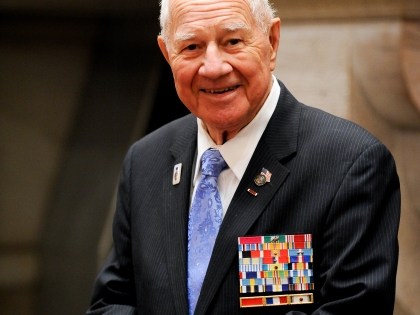
Region's Community Colleges Launch $4 Million Disaster Preparedness Program
William J. Larkin Jr.
October 19, 2006
New York State Senators Bill Larkin, John Bonacic, and Thomas P. Morahan have joined forces to make a major $4 million investment in the region’s ability to train professionals for disaster preparedness.
The new Hudson Valley Domestic Preparedness Community College Consortium will allow students throughout the Hudson Valley to take classes on the campuses of Ulster, Orange, Rockland and Sullivan Counties and receive a degree in emergency management, fire protection technology, emergency medical services, cyber security and basic police training. The funding for the program was obtained by Senators Larkin, Bonacic, and Morahan in the 2006-2007 State Budget. Funding will provide for new state of the art distance learning facilities and labs for consortium programs.
"Our community colleges are particularly well-suited to help us meet a need in our region that is reaching the critical point," said Senator Larkin. "Community colleges admit thousands of students each year. I believe that this innovative program will attract many of those men and women into the fields of emergency services and first responders and help improve the disaster response capabilities in our region."
In the spring of 2005, Senators Larkin and Bonacic met with Ulster County Community College President Don Katt to discuss the emerging education trends in disaster preparedness. Only a little more than a year later, after receiving the enthusiastic cooperation of community colleges in Orange, Sullivan, and Rockland Counties, the Hudson Valley Disaster Preparedness Initiative is being launched.
The $4 million initiative will allow students throughout the Hudson Valley to take classes on the campuses of Ulster, Orange, Rockland and Sullivan Counties and receive a degree in emergency management.
Through the Consortium, the participating colleges will grant Associate Degrees and Certificates to prepare graduates for careers in emergency medical services, fire protection science, law enforcement, emergency management and cyber-security. Graduates will be in a prime position to seek jobs with professional fire departments,police departments and emergency service organizations, as well as in private industry as emergency management specialists in the Hudson Valley and in the metropolitan area.
Marianne Collins, Director of Institutional Advancement at UCCC and the coordinator of the project for all four colleges, said, "Individually, our colleges could not have done this. As a group, through the leadership of Senators Larkin, Bonacic, and Morahan, and the innovative work of the colleges, we have made it happen."
"There is a critical need throughout the region and the metropolitan area for well-educated managers in emergency services and preparedness," said Dr. Donald C. Katt, President of SUNY Ulster County Community College. "These degree and certificate programs can accommodate people who may not want a traditional liberal arts program but who recognize the value that post secondary education brings to serving the public in important, security related ways."
The Consortium will be administered jointly by all four campuses - Ulster, Orange, Rockland and Sullivan. The presence of live, interactive video classrooms connecting the campuses to each other, will allow a diverse array of classes to be taught at the same time to students at any one of the four campuses. In addition, full use will be made of online instruction to supplement and expand the range of classroom offerings.
"Our graduates will be ready to take leadership roles in major fire, police, emergency service and security departments throughout the region," said Dr. William Richards, President at SUNY Orange. "They will have a background in management, understand the principles behind providing emergency services and be able to apply their knowledge in the 'real world' in the most dangerous situations."
Tuition will be the same as regular courses offered at the campuses. The first interactive classes are expected to begin in spring 2007. Two years ago, each volunteer fire department and EMS organization in the State was also given the opportunity to have one member receive a scholarship at any SUNY school. This unique collaboration among the four colleges, which collectively serve 900,000 Hudson Valley residents, is an important example of regionalism working for the greater good in a most effective and efficient way.